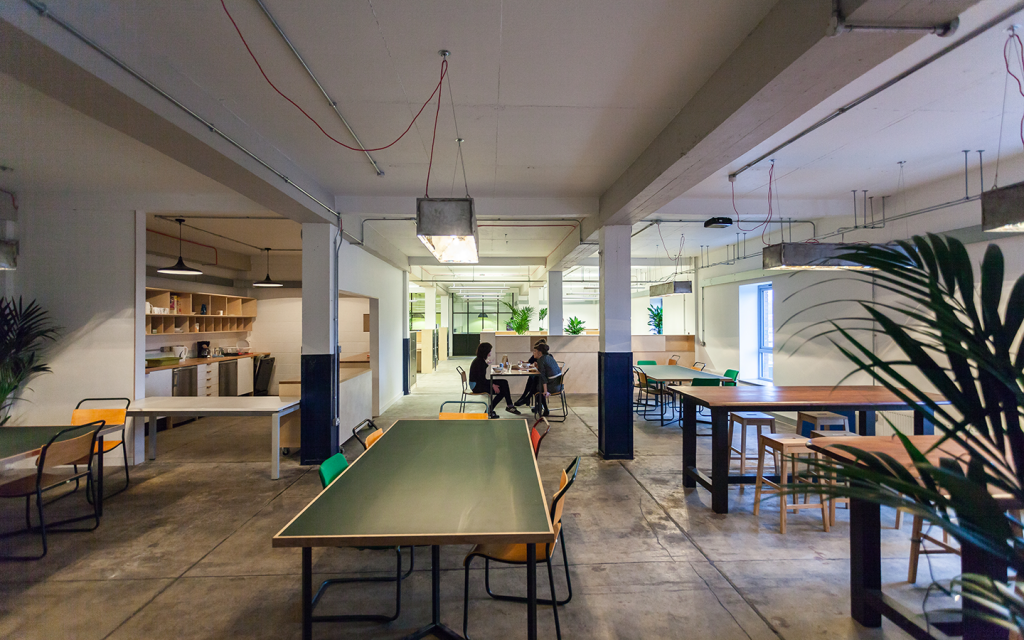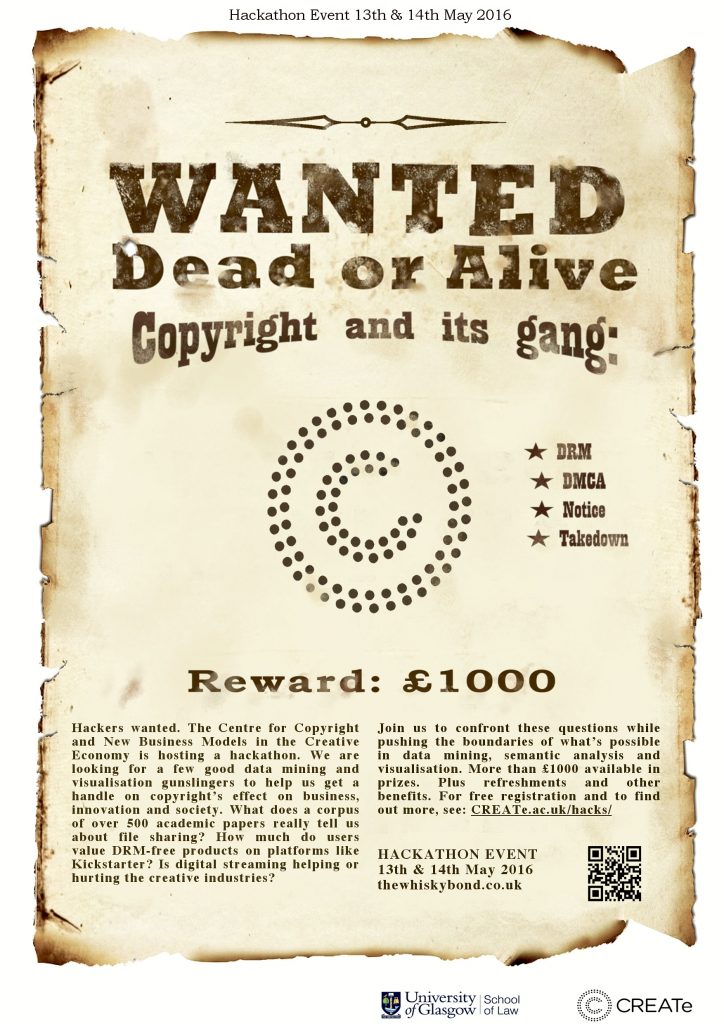Hackathon Event Resource Page
CREATe, the Centre for Copyright and New Business Models in the Creative Economy organised a hackathon event on 13th & 14th May 2016. The event took place over 24 hours from 18:00pm on Friday 13th until 20:00pm Saturday 14th. The venue was The Whisky Bond in Glasgow [Map]. Below we have produced a short video about the event highlighting the challenges and winners:
The runner-up prize was awarded to Simone Farrer and David Jones for their pitch on improving the accessibility and searchability of the Copyright Evidence Wiki.
The winning team was XPMGLA, consisting of members Maribel Hidalgo-Urbaneja, Elina Koristashevskaya, Irina Preda, Stuart Purcell and Swagatam Sinha. The winners earned the top prize of £1000 for their pitch on visualising the relationship between open licensing and user-led creative production in the market for computer games.
We congratulate our winners and thank all of our participants for a fantastic event!

Event Archive
Below we have archived a description of the event, including rules and resources related to the three challenges.

CREATe is an interdisciplinary research centre at the University of Glasgow studying the role of copyright in society. We support reforming copyright law to better reflect the needs of users while promoting a vibrant public domain. A major challenge we face is that we generate a lot of data, but we are not always able to visualise it effectively. In order to have an impact, we need to communicate findings to policy makers and the public. Media companies and rightsholders have asked for stronger and stronger copyright protection. Our data suggest that other approaches may be better. Help us present the best evidence for copyright reform to politicians, industry and the public. The purpose of this hackathon is to explore ways to innovatively mine, analyse and visualise data about the effects of copyright.
Participants are invited to take part in one of the following challenges. Have a look at the resources below and get started with ideas before the event:

Venue and Format:
The hackathon will take place in the Distillery workspace at the Whisky Bond, 2 Dawson Rd, Glasgow [map]. The event will run from 18:00 on Friday 13th May to 20:00 on Saturday 14th May.

Day 1 will begin at 18:00 with presentations about each challenge by the event organisers. A choice between three challenge topics will be offered to participants. Each challenge is closely connected to the overall theme of data mining, visualisation and copyright. More detail about each of the challenges is provided below.
Participants will select the challenge they wish to work on and will organise themselves into teams. Teams must comprise at least 2 people, up to a maximum of 5. Over the following 24 hours, teams will work on their pitches. Mentors from CREATe will be on hand throughout the event to consult with teams as they develop their solutions.
To enable those with families to participate, the venue will close at midnight and will open again at 9:00am on Day 2.
Day 2 will begin at 9:00 am with teams working on their projects over the course of the day. At 18:00 we will close with a judging session consisting of policy, research and technology experts. The winners will be announced and feedback will be offered to all participants.
The first prize is £1000. Runner-up prize is £200. Winning teams may also be invited to further develop tools in partnership with CREATe, subject to available follow-on funding. Prize money has been generously contributed by the ESRC Impact Acceleration Account at the University of Glasgow.

We’ve all heard evidence that Napster and other peer-to-peer file sharing technologies reduced music industry revenue. But revenue is only half the story. Compelling studies by economists show that music production is actually on the rise — that’s because digital technology also reduced the costs of making and distributing music. Better dissemination of rigorous research about copyright could improve policy decision making.
We’ve created a Wiki to collect and share all of the available evidence on copyright’s effects (http://copyrightevidence.org). Since government often hears first from industry lobbyists, we want to make sure that politicians have access to the full story before taking decisions.
Currently the wiki contains insights that are impossible to see. One advantage of the Wikimedia platform is that it enables comparison of academic papers by adhering to a semantic data structure. Extracting hidden meaning through comparison of academic studies is often a goal of data mining, for example in medicine. We think it should be possible to generate similar insights by mining and visualising the collection of studies contained in the Copyright Evidence Wiki.
[expand title=”More resources related to this challenge”]On the Copyright Evidence Wiki, approximately 500 studies are fully catalogued by sector, industry, country, research method, etc. The main results of each study are also summarised in free text (example here).
We’ve already done some basic visualisations using the semantic Wiki structure of the data(link). However, we’ve barely begun to exploit the potential of this resource.
[/expand]It has been argued that strong copyright protection is required to stimulate creativity. But as platforms like Kickstarter and Steam demonstrate, alternative business models and consumer practices have emerged. For example, crowdfunded producers collect money directly from fans and consumers. On the video game retail platform Steam, certain ‘early access’ products enable inputs and modifications by fans. A challenge for us is to understand how these new creators achieve success and earn revenue in the digital environment. Fortunately, digital markets record and display lots of data that could be used to explore this question.
Until now, our own research in this area has used human research assistants to collect and interpret data from digital markets. But humans are slow, expensive and subject to bias. We’d like to be able to do text mining on a much larger corpus of creative goods in online marketplaces, in real time. Examples might include YouTube, Kickstarter or Steam, but more platforms are added regularly. Meeting this challenges will involve working together to develop research questions and tools to collect and interpret data from a range of online sources. Results will help strengthen the case that alternatives to strict IP protection can help creativity thrive online.
[expand title=”More resources related to this challenge”]Previous research at CREATe has explored how the public domain might be beneficial for follow-on creators and generate economic value. For example, in 2014 we looked at 1,997 Kickstarter pitches to see whether creators make effective use of public domain or creative commons inputs (Download report). We found that they did, and those products were more successful at raising funds than purely original works.
We’d like to extend this research to incorporate more platforms, larger datasets and more insight about the role of user-creators. For example, if it were possible to gather information about fan modifications of video game titles on Steam, we could test whether this practice has any effect on price or popularity.
[/expand]
An important question for copyright research is whether consumers prefer to access content legally when high-quality alternatives to piracy exist. We’ve heard the argument that piracy increases when content is blocked in certain countries, or when legal alternatives are held back by DRM restrictions. But is it true? If so, better business models, rather than more enforcement, might be the preferred way to deal with piracy.
Tackling this research challenge will require creativity and insight into pirate behaviour as well as legal consumption. We know for example, that subscription services such as Spotify are growing in membership. But we don’t know if those people paying for Spotify have reduced their illegal consumption, or even whether they were pirates in the first place. One way to attack the question might be to see if geoblocking or DRM locks on certain commercial releases are associated with increased rates of piracy. But gathering reliable data on pirate behaviour is a challenge.
[expand title=”More resources related to this challenge”]Some data already exists on legal consumption and piracy by consumers in the UK. Ofcom commissioned five waves of a large-scale consumer survey from 2012 to 2015. The survey captured detailed demographic information as well as rates of consumption of different media, both legally and illegally. The surveys are accessible via our Online Media Behaviour Analytics (OMeBa) tool (beta version here).
[/expand]
Rules and Eligibility:
Dates and times: In order to be eligible, all team members must be registered and must participate in all hackathon activities. Team members must be present in the venue from 18:00pm – 12:00 midnight on 13th May, and from 10:00am – 18:00pm on 14th May.
Team Composition: Teams can come pre-formed or can form on the day. Event organisers will facilitate team formation for participants who do not have teams and may alter some of the pre-formed teams to accommodate everyone. Teams must consist of at least 2 people, up to a maximum of 5.
Selection of winners: Selection will be made by a judging panel consisting of members of staff of the University of Glasgow CREATe Centre (the organising institution). The first prize is £1000 to be distributed evenly among members of the winning team. The second prize is £200, to be distributed evenly among members of the second place team.
Code of Conduct: All attendees, sponsors, partners, volunteers and staff at our hackathon are required to agree with the following code of conduct. Organisers will enforce this code throughout the event. We expect cooperation from all participants to ensure a safe environment for everybody.
Our hackathon is dedicated to providing a harassment-free experience for everyone, regardless of gender, gender identity and expression, age, sexual orientation, disability, physical appearance, body size, race, ethnicity, nationality, religion, previous hackathon attendance or computing experience (or lack of any of the aforementioned). We do not tolerate harassment of hackathon participants in any form. Sexual language and imagery is not appropriate at any hackathon venue, including hacks, talks, workshops, parties, social media and other online media. Hackathon participants violating these rules may be sanctioned or expelled from the hackathon at the discretion of the hackathon organisers. [Learn more about the hack code of conduct]

Event Poster:

Event Organisers:
Lead Organisers:
Kris Erickson (Contact)
Jesus Rodriguez Perez (Contact)
Theodore Koutmeridis
Team Mentors:
Megan Blakely
Christian Geib
Jesus Rodriguez Perez
Bartolomeo Meletti
Meryem Horasan
Jaakko Miettinen
Judging panel:
Martin Kretschmer (Director, CREATe)
Arlene McDaid (Founder, Legal Hackers Scotland)
Kris Erickson (Research Fellow, Uniersity of Glasgow)
Pauline McBride (School of Law, University of Glasgow)

